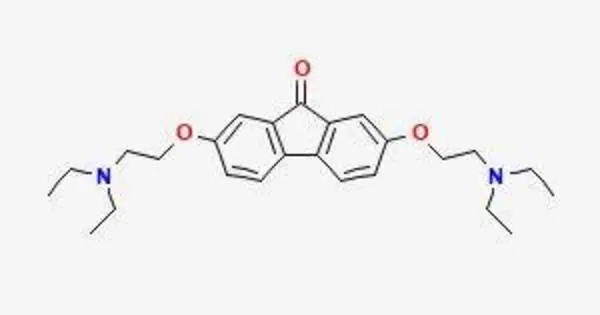Tilorone is the first synthetic, tiny molecular-weight molecule identified as an orally active interferon inducer. It is a synthetic chemical with antiviral activity. It is used as an antiviral medicine in nations that do not require double-blind placebo-controlled trials, such as Russia. It is effective against the Ebola virus in mice.
Tilorone, an antiviral medication, was developed in the 1960s. It belongs to a class of molecules known as synthetic dihydroorotates and has been studied for its ability to treat a variety of viral diseases, including influenza and herpes simplex. Tilorone works by interfering with viral replication, preventing them from spreading and infecting others.
While tilorone has shown promise in laboratory studies and animal models, its use in humans has been limited. This is partly due to the availability of other antiviral drugs with better efficacy and safety profiles. Additionally, there may have been challenges in achieving sufficient levels of effectiveness while minimizing potential side effects.
Here are some of its key properties and uses:
- Antiviral Activity: It has been shown to exhibit antiviral activity against a variety of viruses, including influenza viruses, herpes simplex virus, hepatitis B virus, and others. It works by interfering with viral replication, thus inhibiting the spread and progression of viral infections.
- Immunomodulatory Effects: It also has immunomodulatory properties, which means it can impact the immune system’s function. This property can help the body’s natural defenses against infections.
- Route of Administration: It can be given orally, making it suitable for usage in both outpatient and inpatient settings. This oral availability increases its usefulness and applicability in therapeutic settings.
- Experimental Applications: Tilorone has shown potential antiviral activity in laboratory trials, but its clinical application has been limited. However, it is still being researched for possible usefulness in a variety of viral illnesses.
Safety Profile
Tilorone’s safety profile has been investigated to some extent, but like with any medication, it may be associated with adverse effects. Common adverse effects described in studies include stomach pain, nausea, and headaches. Tilorone, like any other medicine, should only be used under the supervision of a healthcare expert.
Research and Development
Tilorone has been tested in a variety of preclinical and clinical situations. Researchers are still investigating its possible applications, including its potency against new viral infections and its usage in combination therapy.
Overall, tilorone’s antiviral and immunomodulatory capabilities make it an appealing chemical for future research and therapeutic applications in the treatment of viral infections.















